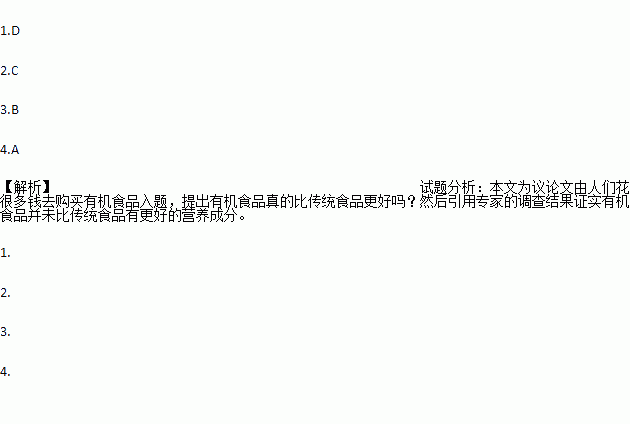题目内容
Is It Worth Buying Organic Food?
Organic food, grown without artificial chemicals, is increasingly popular nowadays. Consumers have been willing to pay up to twice as much for goods with organic labels (商标). However, if you think paying a little more for organic food gets you a more nutritious and safer product, you might want to save your money. A study led by researchers at Stanford University says that organic products aren't necessarily more nutritious, and they're no less likely to suffer from disease-causing bacteria, either.
The latest results, published in the Annuals of Internal Medicine, suggest that buyers may be wasting their money. "We did not find strong evidence that organic food is more nutritious or healthier," says Dr. Crystal Smith-Spangler from Stanford. "So consumers shouldn't assume that one type of food has a lower risk or is safer."
For their new study, Smith-Spangler and her colleagues conducted a review of two categories of research, including 17 studies that compared health outcomes between consumers of organic against traditional food products, and 223 studies that analyzed the nutritional content of the foods, including key vitamins, minerals and fats.
While the researchers found little difference in nutritional content, they did find that organic fruit and vegetables were 20% less likely to have chemicals remaining on the surfaces. Neither organic nor traditional foods showed levels of chemicals high enough to go beyond food safety standards. And both
organic and traditional meats, such as chicken and pork, were equally likely to be harmed by bacteria at very low rates. The researchers did find that organic milk and chicken contained higher levels of omega-3 fatty acids, a healthy fat also found in fish that can reduce the risk of heart disease. However, these nutritional differences were too small, and the researchers were unwilling to make much of them until further studies confirm the trends.
Organic food is produced with fewer chemicals and more natural-growing practices, but that doesn't always translate into a more nutritious or healthier product. The U. S. Department of Agriculture (USDA) states that "whether you buy organic or not, finding the freshest foods available may have the biggest effect on taste." Fresh food is at least as good as anything marketed as organic.
1.The new research questions whether organic food __________.
A. should replace traditional food
B. has been overpriced by farmers
C. is grown with less harmful chemicals
D. is really more nutritious and healthier
2.Smith-Spangler and her colleagues found that __________.
A. organic food could reduce the risk of heart disease
B. traditional food was grown with more natural methods
C. both organic and traditional food they examined were safe
D. there was not a presence of any forms of bacteria in organic food
3.Which of the following is relatively healthier according to the passage?
A. Organic chicken and pork.
B. Organic milk and chicken.
C. Traditional chicken and pork.
D. Traditional fruit and vegetables.
4.What is the author's attitude toward organic food?
A. Sceptical. B. Neutral. C. Unconcerned. D. Approving.
Passage1(2017·全国新课标I,A)
体裁 | 话题 | 词数 | 难度 | 建议时间 |
应用文 | Pacific Science Center | 231 | ★★☆☆☆ | 5分钟 |
Pacific Science Center Guide
◆Visit Pacific Science Center’s Store
Don’t forget to stop by Pacific Science Center’s Store while you are here to pick up a wonderful science activity or souvenir to remember your visit. The store is located(位于) upstairs in Building 3 right next to the Laser Dome.
◆Hungry?
Our exhibits will feed your mind, but what about your body? Our café offers a complete menu of lunch and snack options, in addition to seasonal specials. The café is located upstairs in Building 1 and is open daily until one hour Pacific Science Center closes.
◆Rental Information
Lockers are available to store any belongs during your visit. The lockers are located in Building 1 near the Information Desk and in Building 3. Pushchairs and wheelchairs are available to rent at the Information Desk and Denny Way entrance. ID required.
◆Support Pacific Science Center
Since 1962, Pacific Science Center has been inspiring a passion(热情) for discovery and lifelong learning in science, math and technology. Today, Pacific Science Center serves more than 1.3 million people a year and brings inquiry-based science education to classrooms and community events all over Washington State. It’s an amazing accomplishment and one we cannot achieve without generous support from individuals, corporations, and other social organizations. Visit pacificsciencecenter.org to find various ways you can support Pacific Science Center.
1.Where can you buy a souvenir at Pacific Science Center?
A. In Building 1.
B. In Building 3.
C. At the Laser Dome.
D. At the Denny Way entrance.
2.What does Pacific Science Center do for schools?
A. Train science teachers.
B. Distribute science books.
C. Inspire scientific research.
D. Take science to the classroom.
3.What is the purpose of the last part of the text?
A. To encourage donations.
B. To advertise coming events.
C. To introduce special exhibits.
D. To tell about the Center’s history.

